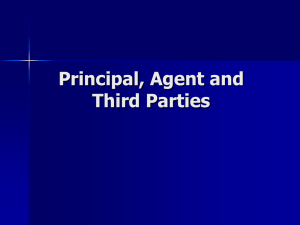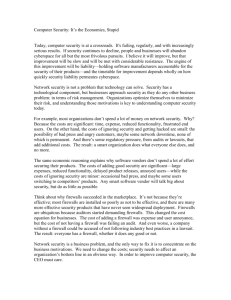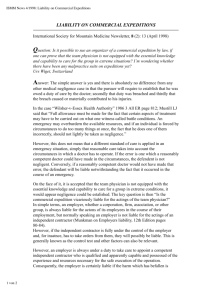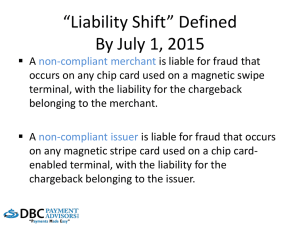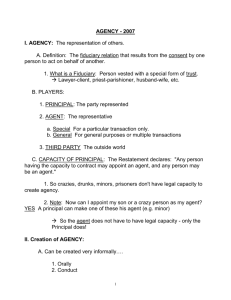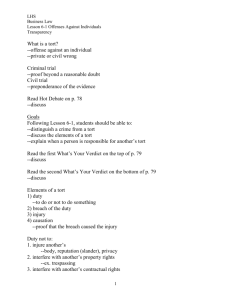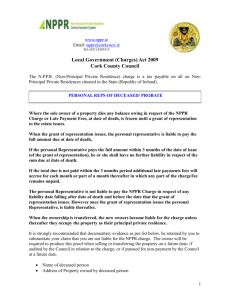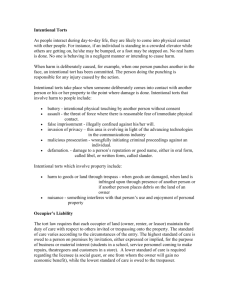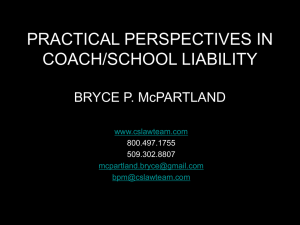RO 11
advertisement
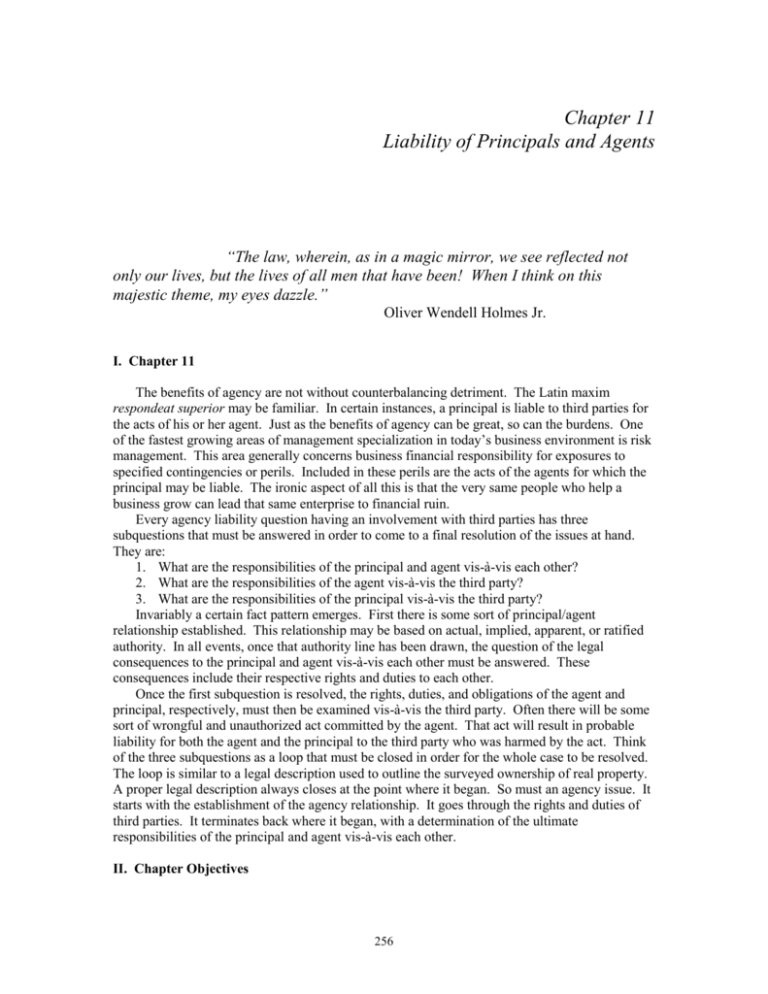
Chapter 11 Liability of Principals and Agents “The law, wherein, as in a magic mirror, we see reflected not only our lives, but the lives of all men that have been! When I think on this majestic theme, my eyes dazzle.” Oliver Wendell Holmes Jr. I. Chapter 11 The benefits of agency are not without counterbalancing detriment. The Latin maxim respondeat superior may be familiar. In certain instances, a principal is liable to third parties for the acts of his or her agent. Just as the benefits of agency can be great, so can the burdens. One of the fastest growing areas of management specialization in today’s business environment is risk management. This area generally concerns business financial responsibility for exposures to specified contingencies or perils. Included in these perils are the acts of the agents for which the principal may be liable. The ironic aspect of all this is that the very same people who help a business grow can lead that same enterprise to financial ruin. Every agency liability question having an involvement with third parties has three subquestions that must be answered in order to come to a final resolution of the issues at hand. They are: 1. What are the responsibilities of the principal and agent vis-à-vis each other? 2. What are the responsibilities of the agent vis-à-vis the third party? 3. What are the responsibilities of the principal vis-à-vis the third party? Invariably a certain fact pattern emerges. First there is some sort of principal/agent relationship established. This relationship may be based on actual, implied, apparent, or ratified authority. In all events, once that authority line has been drawn, the question of the legal consequences to the principal and agent vis-à-vis each other must be answered. These consequences include their respective rights and duties to each other. Once the first subquestion is resolved, the rights, duties, and obligations of the agent and principal, respectively, must then be examined vis-à-vis the third party. Often there will be some sort of wrongful and unauthorized act committed by the agent. That act will result in probable liability for both the agent and the principal to the third party who was harmed by the act. Think of the three subquestions as a loop that must be closed in order for the whole case to be resolved. The loop is similar to a legal description used to outline the surveyed ownership of real property. A proper legal description always closes at the point where it began. So must an agency issue. It starts with the establishment of the agency relationship. It goes through the rights and duties of third parties. It terminates back where it began, with a determination of the ultimate responsibilities of the principal and agent vis-à-vis each other. II. Chapter Objectives 256 Liability of Principals and Agents Describe the duty of loyalty owed by an agent to a principal. Describe the principal’s and agent’s liability on third-party contracts. Identify and describe the principal’s liability for the tortious conduct of an agent. Describe how independent contractor status is created. Describe the principal’s liability for torts of an independent contractor. III. Key Question Checklist What are the principal and agent’s duties to each other? How did a relationship with a third party come about? What are the principal and agent’s duties to the third party? What is an independent contractor? IV. Text Materials Agency law controls the responsibilities and duties of principals, and agents, and defines their relationship and that of independent contractors. Section 1: Agent’s Duty of Loyalty to the Principal Agents owe both a duty of loyalty and a fiduciary duty to the principal. Agents will be liable to the principal for breaches of loyalty. The most common examples of this include undisclosed self-dealing, usurping opportunities that belongs to the principal, competing with the principal during the course of an agency, misusing confidential information about the principal’s affairs acquired during the course of the agency, and undisclosed dual agency. The agent can defend against these claims by making full disclosure to the principal before taking action (self-dealing, usurping, dual agency) or by using generally available information or knowledge (misuse of confidential information). An agent is free to compete with a principal after termination of the relationship if there is no enforceable covenant-not-to-compete. Section 2: Contract Liability to Third Parties Principals that authorize agents to enter into contracts with a third party will be liable on the contract. The agent may also be held liable under the contract, depending upon the type of agency. Fully Disclosed Agency- This is the result of the third party knowing that the agent is acting as such for an identified principal. The agent has no liability under the contract unless they have guaranteed the performance of the principal. Partially Disclosed Agency-This occurs when the agent discloses their agency status but not the identity of the principal to the third party. In this event, both the principal and the agent are liable on third party contracts, because the third party must rely on the agent’s reputation or credit when entering into the agreement. The agent is indemnified for any liability by the principal, and the third party can agree to relieve the agent of any liability under the contract. Undisclosed Agency- This is when the third party is unaware of both the existence of the agency or of the principal. Both the principal and the agent are liable on the contract. The agent becomes the principal to the contract, but they are indemnified by the principal, and can recover for any losses. Agent Exceeding the Scope of Authority- When an agent enters into a contract on behalf of a principal, there is an implied warranty of authority. If the agent exceeds the scope of their authority, the principal will not be bound unless it is ratified. Instead, the agent remains liable. 257 Chapter 30 Tort Liability to Third Parties Both principal and agent are liable for their own tortious conduct. The principal is liable for the tortious conduct of an agent who is acting within the scope of their authority. An agent is liable for tortious acts of a principal only if they aid or abet the conduct. Negligence - Principals are liable for acts performed by agents acting within the scope of their authority under the common law doctrine of respondent superior, which is based on the legal theory of vicarious liability. Frolic and Detour - Agents sometimes do things during the course of their employment that furthers their personal interests, such as running personal errands. This is referred to as frolic and detour. Agents are responsible for their own tortious act. Principals are usually relieved of liability unless the deviation is minor. Courts will review these on a case-by-case basis. The “Coming and Going” Rule - Under the coming and going rule, principals are generally not held liable for injuries caused by agents or employees on their way to and from work, even if the principal supplies the transportation. Dual-Purpose Mission - If an agent injures someone while on a dual-purpose mission, that is where they are asked by the employer to run an errand when they are on personal business, then most jurisdictions hold both the agent and the principal liable. Intentional Torts – The principal is not liable for intentional torts of agents and employees that are committed outside the principal’s scope of business. However, they are held liable under the doctrine of vicarious liability for any intentional torts committed within the agent’s scope of employment. The courts apply either the motivation test to judge whether the agent’s motivation was to further the employer’s business or the work-related test to see if the agent committed the intentional tort within a work-related time or space, in order to determine if the principal is liable for any injuries caused by the agent’s intentional torts. Misrepresentation – Principals are liable for both the intentional and innocent misrepresentations of their agents. Intentional misrepresentation occurs when the agent makes statements that he knows are false. Innocent misrepresentations occur when the agent negligently makes a misrepresentation to a third party. The third party may rescind the contract and recover any consideration paid or affirm the contract and recover damages. Section 4: Independent Contractor Outsiders who are employed by principals to perform certain tasks are called independent contractors. Factors for Determining Independent Contractor Status – The key point for determining whether or not someone is an independent contractor is the degree of control that the principal has. The factors that the court reviews is whether the worker is engaged in a distinct occupation or an independently established business, the length of time the agent has been employed, and the amount of time that he works for the principal, who supplies the tools, equipment, and administrative and support staff used, the method of payment, degree of skill needed, and who controls the manner and means of accomplishing the tasks. Liability for an Independent Contractor’s Contracts – Principals are bound by authorized contracts, but not those entered into without the express or implied authority. Liability for an Independent Contractor’s Torts – The principal is not liable for the torts of their independent contractors, since they do not control the means by which their results are accomplished 258 Liability of Principals and Agents Exceptions Where a Principal Is Liable for the Torts of an Independent Contractor – The principal will be held liable for the torts of an independent contractor in the case of inherently dangerous activities and when they are negligent in selecting the contractor. V . Terms “coming and going” rule—A rule that says a principal is generally not liable for injuries caused by its agents and employees while they are on their way to or from work. dual-purpose mission—An errand or other act that a principal requests of an agent while the agent is on his or her own personal business. duty of accountability—A duty that an agent owes to maintain an accurate accounting of all transactions undertaken on the principal’s behalf. duty of notification—An agent’s duty to notify the principal of information he or she learns from a third party or other source that is important to the principal. duty of performance—An agent’s duty to a principal that includes (1) performing the lawful duties expressed in the contract and (2) meeting the standards of reasonable care, skill, and diligence implicit in all contracts. duty to compensate—A duty that a principal owes to pay an agreed-upon amount to the agent either upon the completion of the agency or at some other mutually agreeable time. duty to cooperate—A duty that a principal owes to cooperate with and assist the agent in the performance of the agent’s duties and the accomplishment of the agency. duty to indemnify—A duty that a principal owes to protect the agent for losses the agent suffered during the agency because of the principal’s misconduct. duty to reimburse—A duty that a principal owes to repay money to the agent if the agent spent his or her own money during the agency on the principal’s behalf. frolic and detour—When an agent does something during the course of his employment to further his own interests rather than the principal’s. implied warranty of authority—An agent who enters into a contract on behalf of another party impliedly warrants that he or she has the authority to do so. imputed knowledge—Information that is learned by the agent that is attributed to the principal. independent contractor—“A person who contracts with another to do something for him who is not controlled by the other nor subject to the other’s right to control with respect to his physical conduct in the performance of the undertaking” [Restatement (Second) of Agency]. innocent misrepresentation—Occurs when an agent makes an untrue statement that he or she honestly and reasonably believes to be true. intentional misrepresentation—Occurs when an agent makes an untrue statement that he or she knows is not true. intentional tort—Occurs when a person has intentionally committed a wrong against (1) another person or his or her character, or (2) another person’s property. motivation test—A test to determine the liability of the principal; if the agent’s motivation in committing the intentional tort is to promote the principal’s business, then the principal is liable for any injury caused by the tort. ratification—When a principal accepts an agent’s unauthorized contract. respondeat superior—A rule that says an employer is liable for the tortious conduct of its employees or agents while they are acting within the scope of his or her authority. 259 Chapter 30 work-related test—A test to determine the liability of a principal; if an agent commits an intentional tort within a work-related time or space, the principal is liable for any injury caused by the agent’s intentional tort. 260

